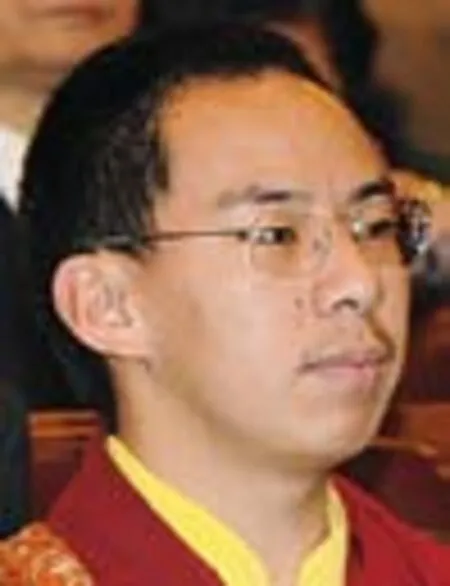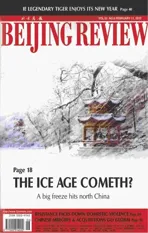PEOPLE/POINTS
2010-09-12
PEOPLE/POINTS
UN Envoys

SHEN HONG
Li Baodong, China’s new permanent representative to the UN, presented his credentials to UN Secretary General Ban Ki-moon in New York on March 4. The day before, He Yafei succeeded Li as permanent representative of China to the UN Offce at Geneva and Other International Organizations in Switzerland.
Li, 55, entered the diplomatic service in 1977. After serving as Ambassador to Zambia in 2005-07, he was appointed permanent representative to the UN Office at Geneva and Other International Organizations in Switzerland. Li studied at the Johns Hopkins University in 1988-89 and was China’s senior offcial for the Asia-Pacifc Economic Cooperation Forum in 1998-2005.
He, 55, was vice minister of foreign affairs from 2008 to January 2010 after a two-year tenure as assistant minister of foreign affairs. He worked at the Permanent Mission of China to the UN in 1992-96 as frst secretary and counselor. He holds a master’s degree from the Graduate Institute of International Studies in Geneva, Switzerland, in 1987.

SHANG JUN
Panchen’s New Role
The 11th Panchen Lama, Bainqen Erdini Qoigyijabu, made his debut in China’s political arena as a political advisor at the annual full session of the National Committee of the Chinese People’s Political Consultative Conference (CPPCC) earlier this month.
“All religions aim at bringing a better spiritual life and guiding people to perform good deeds, thus to beneft the country and its people,” the Panchen Lama said during the CPPCC National Committee session.
The 11th Panchen Lama, one of the two most senior living Buddhas in Tibetan Buddhism, became a CPPCC National Committee member on February 28. Born in February 1990, he is the youngest ever CPPCC National Committee member.
On February 3 this year, he was elected Vice President of the Buddhist Association of China.

CHEN SHUGEN
Recruiter in Need
Zhang Quanshou, a national lawmaker from Henan Province, was a cynosure during this year’s full session of the National People’s Congress (NPC). As founder of China’s frst and now largest agency for migrant workers, he suggested higher salaries and more pro-worker policies to ease ongoing labor shortages in the Pearl River Delta area in south China’s Guangdong Province, one of the world’s largest manufacturing bases.
Zhang’s Quanshun Labor Service Co. in Guangdong’s Shenzhen helps more than 20,000 farmers-turned-workers fnd jobs every year. He hopes to increase the fgure to 40,000 this year.
Known as the “Captain of Migrant Workers,” Zhang, 41, was himself once a migrant worker. Because of poverty, Zhang quit school at the age of 16 and began working to support his family. In 1999, he started up a toy company in Shenzhen six years after settling down in the city. In 2004, Zhang founded Quanshun Co. and has since served as its president. The company recruits workers, offers them free vocational training and contracts them to local enterprises. It also defends workers in labor disputes.
In 2008, Zhang was elected a deputy to the NPC.

ZHU XIANG
“Tibet has nothing to conceal.”
Qiangba Puncog, Chairman of the Standing Committee of Tibet Autonomous Regional People’s Congress, on the sidelines of the full session of the National People’s Congress, the top legislature, on March 7
“An aircraft carrier is just one kind of military equipment and nothing for speculation. It is like someone needing a long-barreled gun and others just wanting a short one. Demands of different countries are different.”
Rear Admiral Cao Dongshen, also deputy to the National People’s Congress
“China’s investment in U.S. treasury bonds is a market behavior, and should not be politicized.”
Yi Gang, Director of China’s State Administration of Foreign Exchange, on March 9
“Any other discussion is a sideshow which will distract from the necessary [fscal] consolidation.”
German central bank chief Axel Weber, opposing the proposal of a European version of the International Monetary Fund to rescue errant EU states
“But they (Icelanders) are not ready to pay a very high interest rate so that the British and Dutch governments would make a huge proft off this whole exercise.”
Icelandic President Olafur Ragnar Grimsson, after Icelanders overwhelmingly rejected a plan to pay Britain and the Netherlands billions for losses in the Icesave bank collapse
“The real solution is to deliver services ... rather than turn Haiti into a military state.”
Ted Constan, chief program offcer for relief organization Partners in Health, upon the withdrawal of U.S. troops from Haiti where they were stationed after the January 12 earthquake
